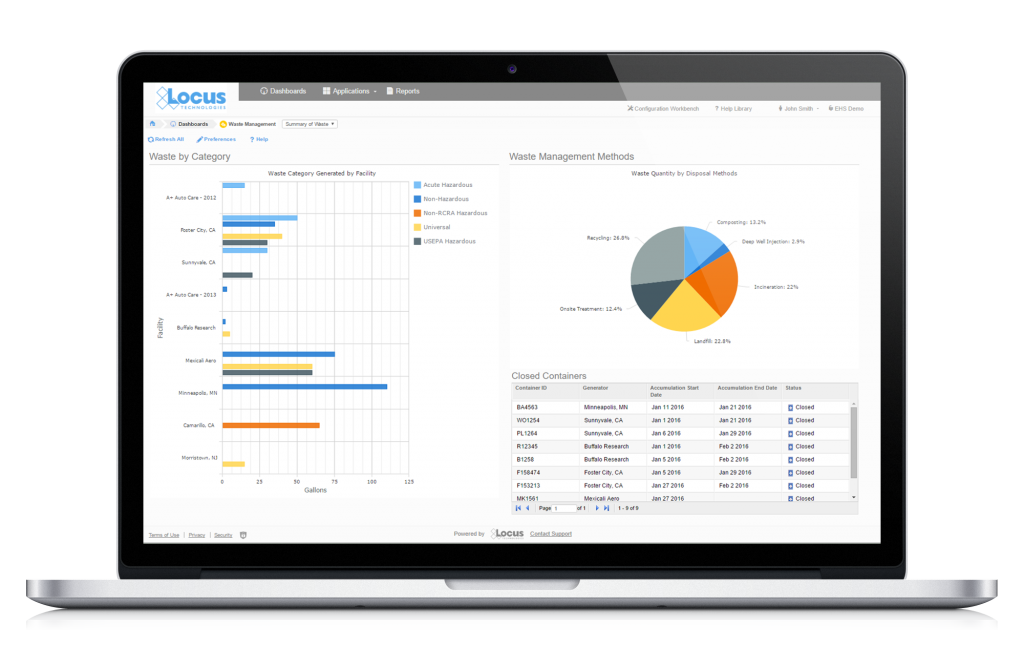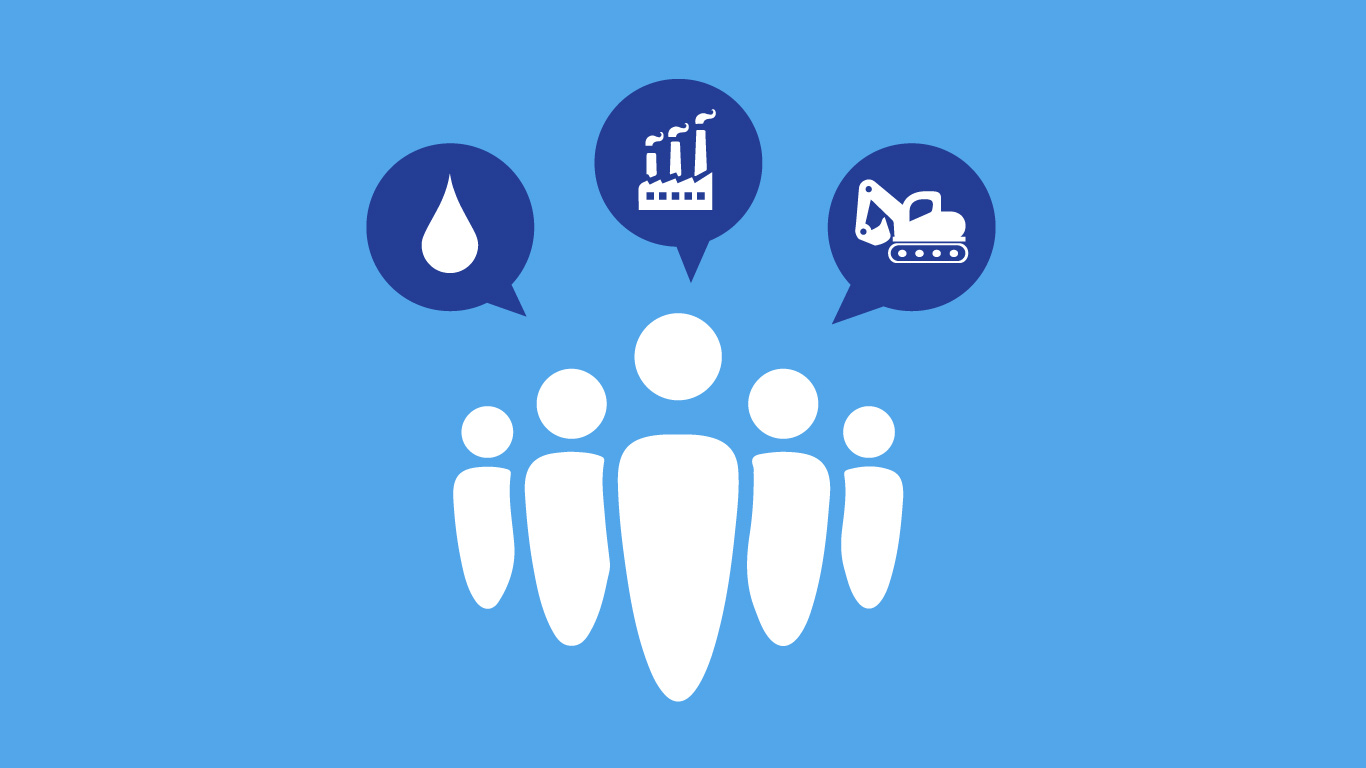Finally, An Environmental Software Suite that Works Together
When looking for a GHG reporting program, there is one element that is typically overlooked. This short video gives us more insight.
When looking for a GHG reporting program, there is one element that is typically overlooked. This short video gives us more insight.
When looking for a GHG reporting program, there is one element that is typically overlooked. This short video gives us more insight.

Waste management is a critical aspect of environmental sustainability, and Locus Technologies is a leading provider of innovative solutions to address waste management challenges. Locus empowers organizations to efficiently manage waste streams, ensure regulatory compliance, and drive sustainable practices.
Locus offers comprehensive waste management software platforms that enable users to streamline waste tracking, reporting, and disposal processes. Locus handles diverse waste types, including hazardous, non-hazardous, and universal waste. Locus features include customizable waste profiles, enabling organizations to accurately classify and track waste based on its characteristics, ensuring proper handling, storage, and disposal in accordance with regulatory guidelines.
When looking for a GHG reporting program, there is one element that is typically overlooked. This short video gives us more insight.
When looking for a GHG reporting program, there is one element that is typically overlooked. This short video gives us more insight.
When looking for a GHG reporting program, there is one element that is typically overlooked. This short video gives us more insight.

It is always concerning when environmental issues are significant enough to start grabbing headlines. Typically for an environmental project to become newsworthy, there have been significant impacts to human health or the environment. It is extremely rare to see any environmental success story in the news, simply because there is no reason for the public to become alarmed about it. So unfortunately, there is usually some level of urgency involved when most companies are putting serious thought into their public communication efforts.
Two primary topics are always at the forefront of criticism when there is any sort of news on environmental projects: 1) the magnitude of the impact and 2) the public communication efforts made for the project. For almost every project, there have been significant efforts put into addressing the first topic. The responsible party has usually invested a lot of time and money into removing contaminants or finding ways to eliminate their impact on the environment. Unfortunately, despite those efforts, if an environmental project is in the news, there is still some outstanding issue (or multiple issues) to be addressed.
On the topic of public communication, however, many responsible parties are doing the minimum required by their regulator, and therefore leave themselves vulnerable to criticism for not doing enough to keep the public informed. One very common form of public communication is fact sheets: one or two-page “plain language” summaries of the environmental project that are intended to be easily understood by the general public. Fact sheets are effective in that they can be bulk mailed to an entire neighborhood and provide all the necessary information. But the downside is that fact sheets often take several months to prepare. Since they are issued by the regulator, they typically require review from multiple divisions within the regulatory body including lawyers and public coordination specialists with very little familiarity with the project. For that reason, fact sheets are usually outdated before they are even published. Most printed formats are subject to the same issue to some extent.
To avoid this scenario, some responsible parties are taking a proactive approach by creating a public-facing website that is continuously updated with the latest project data and status. Current web technologies make this relatively cost-effective to set up and maintain. Certain elements on the website can even be connected to live data so that information is available as soon as it is collected. While there may be some reluctance to this kind of ‘over-sharing,’ it is invaluable in responding to complaints about lack of public communication. Information can be made available to anyone immediately, and email lists can be established for anyone interested in getting notifications on important updates. Additionally, a data review process can be established between the data collection and the public distribution. While this does add a short time gap before making the data publicly available, it ensures the data are representative and valid so that they do not create unnecessary concerns. And the data review process is often much faster than the review of written text.
Communication efforts are becoming increasingly important for environmental projects, whether it is for remediation of legacy sites, keeping pollutants out of the air, or providing safe drinking water. Using modern communication methods can vastly improve the level of public confidence that environmental concerns are being addressed and can also mitigate the risk of negative publicity associated with lagging public communication efforts. If environmental data are continuously made available, there is less for the public to become alarmed about. Consider integration of a public communication program with the ongoing data collection and/or cleanup efforts, rather than addressing the public as an afterthought.
APTIM will leverage Locus Platform ’s configurable, user-friendly software applications to provide innovative environmental solutions to their clients.
MOUNTAIN VIEW, Calif., Sept 5, 2023 — Locus Technologies, (Locus)—the leader in cloud-based environmental, sustainability, energy, and compliance management software—announces a new partnership with APTIM, a leading environmental solutions firm. APTIM provides integrated environmental, resilience, and nuclear decommissioning services for government, commercial and industrial, and energy clients.
Locus and APTIM are establishing a collaborative partnership using Locus software to deliver applications that will provide more efficiency and visibility for APTIM’s clients. APTIM’s clients will benefit from Locus’ off-the-shelf applications for compliance, waste management, auditing, ESG, and others. In combination with APTIM’s experience and knowledge in these areas, Locus and APTIM will also develop new applications to better serve the needs of specific projects. APTIM will use Locus-configurable software to quickly build and deploy applications that uniquely address complex environmental challenges.
“At APTIM, we use the latest, most innovative technologies to deliver exceptional performance and service for our clients,” said APTIM Vice President of Information Technology Jason Bourg. “Locus brings a well-established, highly configurable software that can adapt to our complex projects and leverage our expertise in environmental solutions. We look forward to expanding our relationship with Locus and utilizing the full extent of their software to maximize results for our clients across the U.S., Canada, and Peru.”
Locus Platform is the first fully integrated platform created from the ground up to allow organizations to manage their environmental, energy, water, waste, carbon, air, health and safety, remediation, and compliance information in one place. The platform allows companies to configure their management, tracking, visualization, and reporting through a graphically driven user interface. This feature enables organizations to configure the software to their needs without worrying about the expensive programming efforts usually associated with customization.
“We are very excited about partnering with APTIM as we share the same vision,” said Neno Duplan, CEO of Locus. “We are eagerly looking forward to supporting many successful projects through our partnership with APTIM. Throughout our discussions, APTIM has demonstrated its vision and dedication to excellence. APTIM’s commitment to fostering solid partnerships aligns perfectly with our core values, and we are genuinely excited about this collaboration’s potential.”
About APTIM
APTIM is a leading professional solutions firm with headquarters in Baton Rouge, La. We specialize in environmental services, resilience, sustainability, and energy solutions, as well as technical and data solutions, program management, and critical infrastructure. Our dedicated teammates apply their experience and expertise to provide integrated services and solutions for government agencies, commercial and industrial clients, and energy customers. APTIM commits to accelerating the transition toward a clean and efficient energy economy, building a sustainable future for our communities and natural world, and creating a more inclusive and equitable environment that celebrates the diversity of our people. Learn more at APTIM.com, and connect with us on Facebook, Instagram, LinkedIn, and Twitter.
About Locus Technologies
Locus Technologies, the global environmental, social, governance (ESG), Sustainability, and EHS Compliance software leader, empowers companies of every size and industry to be credible with ESG reporting. From 1997 Locus Technologies pioneered enterprise software-as-a-service (SaaS) for EHS Compliance, water management, and ESG credible reporting. Locus apps and software solutions improve business performance by strengthening risk management and EHS for organizations across industries and government agencies. Organizations ranging from medium-sized businesses to Fortune 500 enterprises, such as Chevron, Sempra, Corteva, DuPont, Chemours, Port of Seattle, The Port Authority of New York and New Jersey, and Los Alamos National Laboratory, have selected Locus.
Locus Technologies’ headquarters is in Mountain View, California.
Wouldn’t it be great if you could just get compliance software with much less time and effort? That is where Locus’ pre-configured apps come in. They are market tested and fully featured yet still allow for flexibility/configurability in key areas such as: Adding new data fields to capture industry specific information. Adding or removing document […]
299 Fairchild Drive
Mountain View, CA 94043
P: +1 (650) 960-1640
F: +1 (415) 360-5889
Locus Technologies provides cloud-based environmental software and mobile solutions for EHS, sustainability management, GHG reporting, water quality management, risk management, and analytical, geologic, and ecologic environmental data management.
